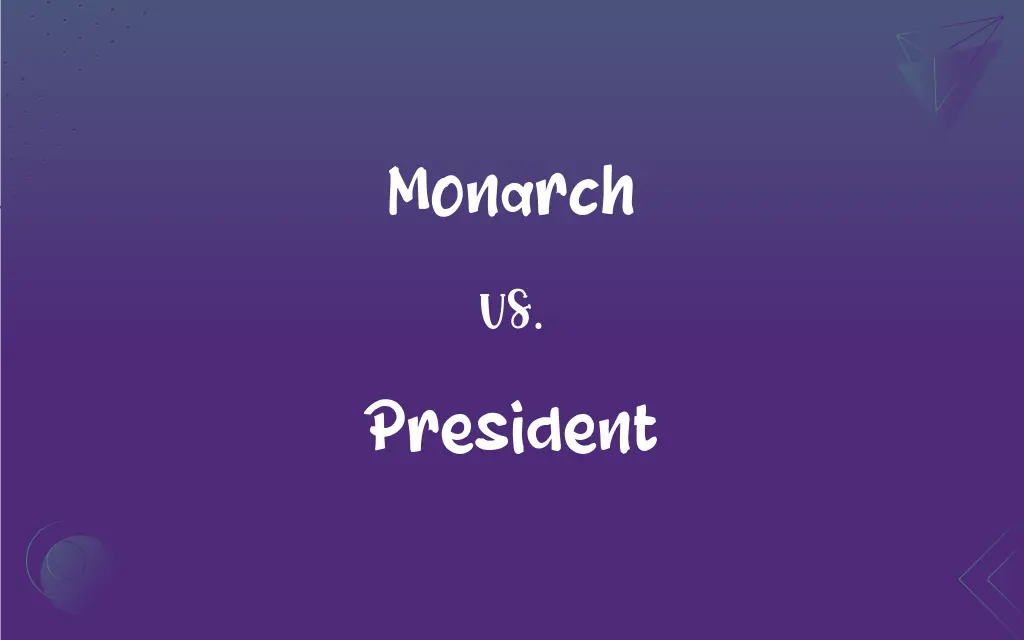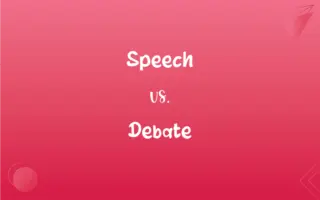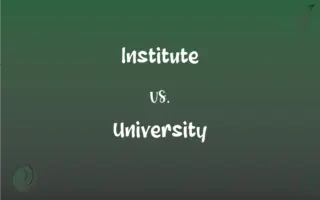Monarch vs. President: What's the Difference?
Edited by Aimie Carlson || By Harlon Moss || Published on November 29, 2023
A monarch is a hereditary or elected sovereign ruler, often with lifelong tenure; a president is an elected or appointed head of state, typically serving for a fixed term.

Key Differences
A monarch is a sovereign head of state in a monarchy, typically inheriting the position by birth and holding it for life. Their role and powers can vary, ranging from symbolic to absolute authority. On the other hand, a president is an elected or appointed leader, usually of a republic, serving for a specified term. The powers of a president also vary, depending on the constitution of the country.
In most cases, the role of a monarch is hereditary, passing down through a royal family. This lineage often holds significant cultural and historical importance. In contrast, presidents are usually chosen through elections or appointments, reflecting the democratic or institutional processes of a country. This system ensures periodic change in leadership.
Monarchs often embody the historical and cultural identity of a nation, with their role steeped in tradition. Their duties may include ceremonial functions, and in constitutional monarchies, they often have limited political power. Presidents, conversely, are typically more involved in the day-to-day governance and policy-making of a nation, holding a position that is more political than symbolic.
In constitutional monarchies, the monarch's powers are usually outlined and restricted by a constitution or laws, with real political power vested in elected bodies. For presidents, the extent of power can vary from largely ceremonial roles in parliamentary systems to significant executive powers in presidential systems.
While a monarch's position is usually for life, a president's tenure is time-bound, often with the possibility of re-election. This term limit ensures a regular opportunity for leadership change, reflecting the will of the people or governing bodies.
ADVERTISEMENT
Comparison Chart
Tenure
Often lifelong
Fixed term
Selection
Usually hereditary, sometimes elected
Elected or appointed
Role
Can be symbolic to absolute
Usually political, varies from ceremonial to executive
Power Source
Birthright or election in elective monarchies
Democratic election or appointment
Change in Leadership
Rare, except in elective monarchies
Periodic, based on term limits
ADVERTISEMENT
Monarch and President Definitions
Monarch
A hereditary ruler of a state or country.
The monarch inherited the throne from her ancestors.
President
A leader or head of an organization, committee, or corporation.
The president of the company announced a new strategic direction.
Monarch
A sovereign head of state, especially a king, queen, or emperor.
The monarch presided over the national celebration with great dignity.
President
The elected head of a republican state.
The president addressed the nation during the crisis.
Monarch
A ruler who reigns over a monarchy.
The monarch’s coronation was a grand event witnessed by thousands.
President
The titular head of a country under a constitutional system, often with limited powers.
The president signed the bill into law after lengthy debates in the parliament.
Monarch
An individual who holds supreme authority, often for life, in a monarchy.
The monarch played a crucial role in upholding the traditions of the realm.
President
A person who presides over a meeting, gathering, or session.
The president of the council ensured the meeting proceeded smoothly.
Monarch
The sole or supreme ruler of a kingdom or empire.
The monarch made decisions that shaped the course of the nation's history.
President
The chief executive officer in certain establishments or institutions.
The president of the university inaugurated the new research facility.
Monarch
A sole and absolute ruler.
President
One appointed or elected to preside over an organized body of people, such as an assembly or meeting.
Monarch
A sovereign, such as a king or empress, often with constitutionally limited authority
A constitutional monarch.
President
The chief executive of a republic.
Monarch
One that commands or rules
"I am monarch of all I survey" (William Cowper).
President
The chief executive officer of the United States, with powers as determined by the US Constitution.
FAQs
Do monarchs have political power?
It varies; in absolute monarchies, they have significant power; in constitutional monarchies, their role is often symbolic.
What is a monarch?
A monarch is a sovereign ruler, often a king, queen, or emperor, who typically inherits the position.
How is a monarch selected?
Monarchs are usually chosen through hereditary succession; some are elected in elective monarchies.
How is a president chosen?
Presidents are usually elected by citizens or appointed by governing bodies.
Can a president be removed?
Yes, through impeachment, resignation, or term completion.
Can a monarch be removed?
It’s rare, but abdication or removal can occur in some circumstances.
Do monarchs participate in elections?
Typically, no; however, elective monarchies have monarchs elected by a vote.
Do presidents participate in elections?
Yes, presidents often come to power through electoral processes.
What is a president?
A president is the elected or appointed head of state, often of a republic, serving for a specified term.
What powers does a president have?
It varies; some have significant executive powers, while others have mainly ceremonial roles.
What is the tenure of a president?
It’s fixed, often 4-6 years, and sometimes renewable.
Are monarchs involved in daily governance?
Not typically; their role is often ceremonial.
Can a president lead a monarchy?
No, presidents are heads of states in republics or similar systems.
Are presidents involved in governance?
Yes, they are usually central to government operations.
Do presidents have a symbolic role?
In some systems, they do, along with executive functions.
Is a monarch’s position lifelong?
Usually, yes, except in elective monarchies.
Do monarchs have successors?
Yes, usually their offspring or nearest relatives.
How is a presidential successor chosen?
Through elections or constitutional processes.
Can a monarch lead a republic?
No, monarchs rule monarchies, not republics.
Can monarchs be elected?
Yes, in elective monarchies, but it’s rare.
About Author
Written by
Harlon MossHarlon is a seasoned quality moderator and accomplished content writer for Difference Wiki. An alumnus of the prestigious University of California, he earned his degree in Computer Science. Leveraging his academic background, Harlon brings a meticulous and informed perspective to his work, ensuring content accuracy and excellence.
Edited by
Aimie CarlsonAimie Carlson, holding a master's degree in English literature, is a fervent English language enthusiast. She lends her writing talents to Difference Wiki, a prominent website that specializes in comparisons, offering readers insightful analyses that both captivate and inform.






































































